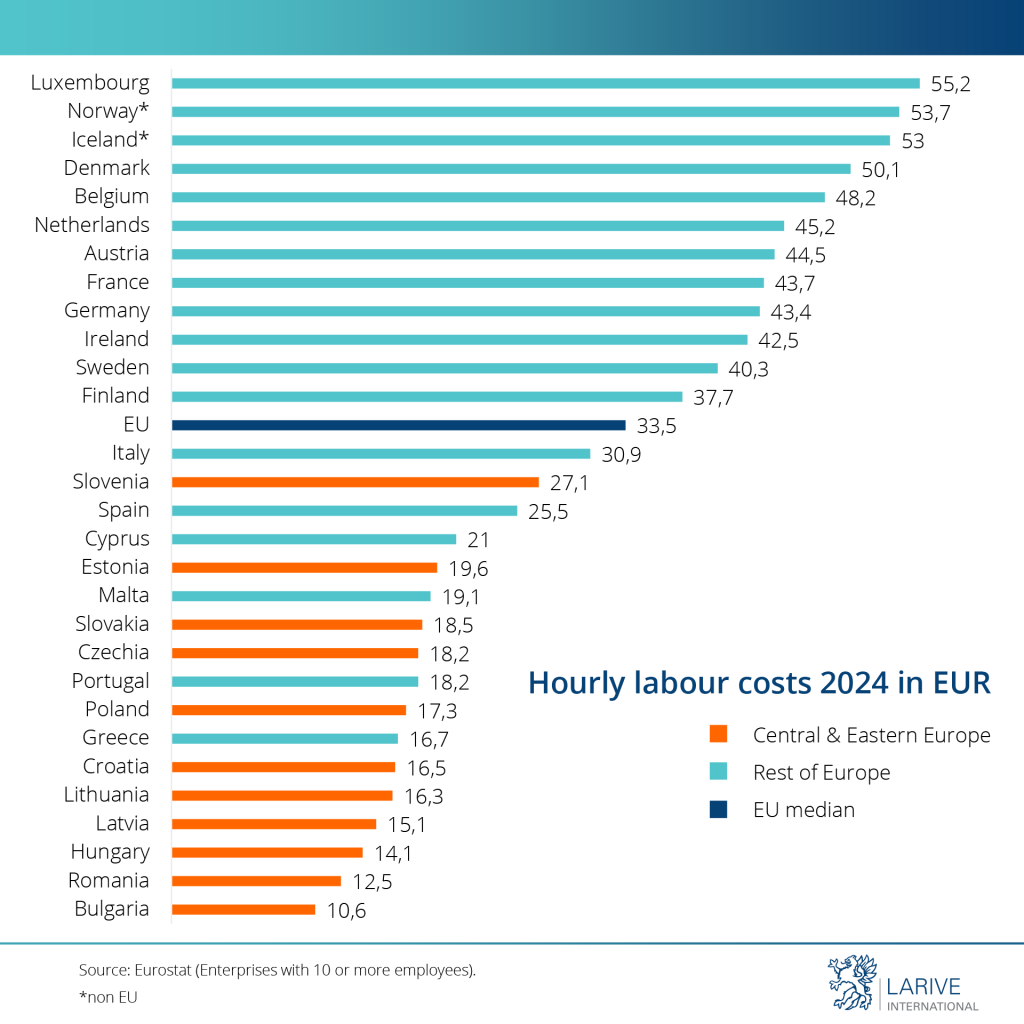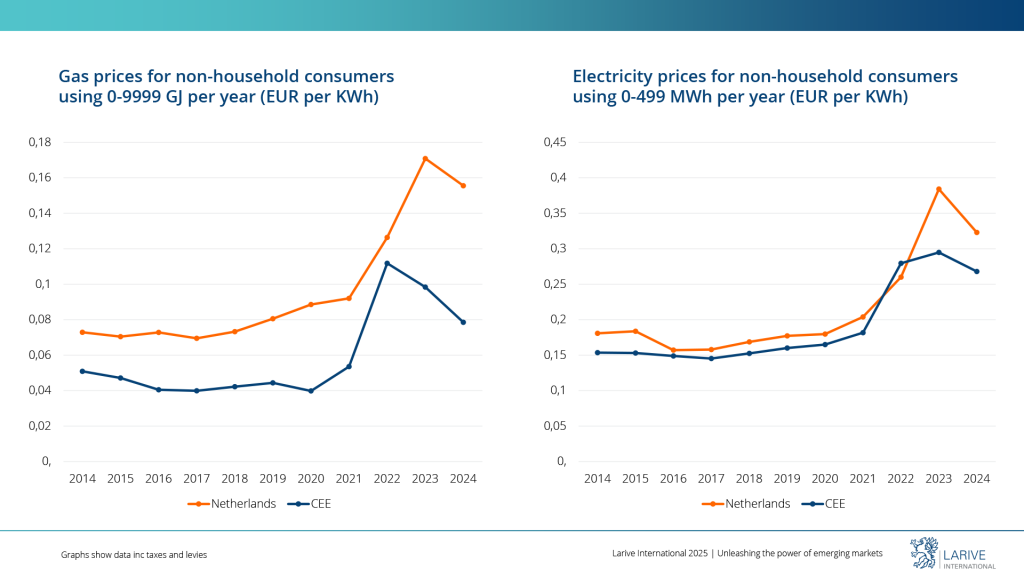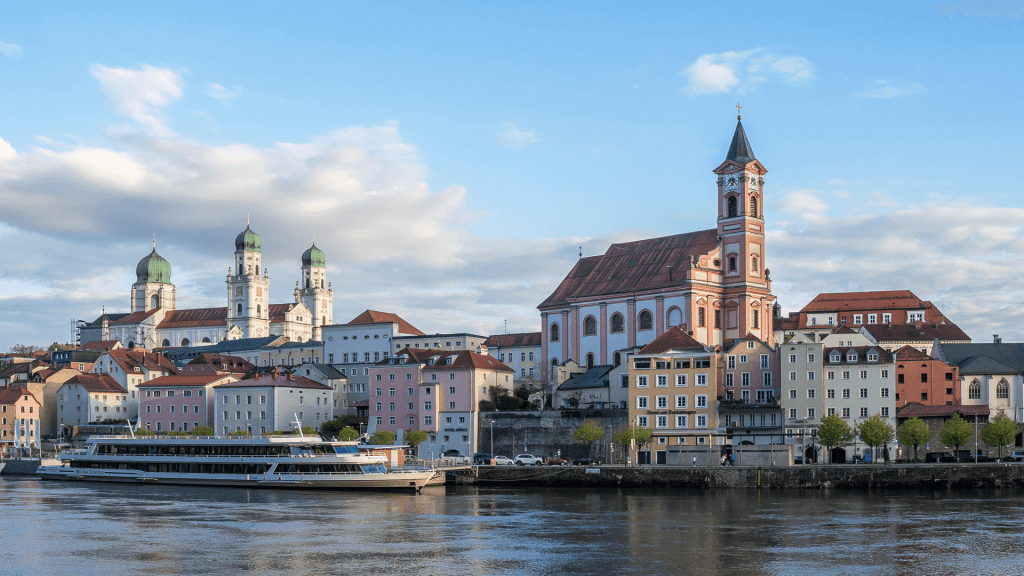Dutch Small and Medium Enterprises (SMEs) are facing increasing difficulties in maintaining steady profit margins. Although SMEs are still growing, recent data and trends highlight an increasingly challenging business environment. The total turnover of Dutch SMEs reached €21 billion; however, their growth has slowed, marking the lowest growth rate in the past decade. This could signal an upcoming standstill in foreseeable growth for businesses in this segment. The shrinking of profit margins is broadly speaking attributed to three main factors:
- Rising labour costs.
- Fluctuating energy prices.
- An increase in regulatory complexity influencing Dutch emission regulation schemes.
These three factors put pressure on the growth of SMEs, but opportunities to manage these factors are certainly present. Labour costs, for example, are not the same everywhere in the EU. Especially in Central and Eastern European (CEE) countries, where they are relatively cheaper. This, among other factors, presents opportunities. In this article, we will discuss a deeper understanding of these three factors pressuring SME growth and present a business case from Larive’s portfolio to manage these pressures.
Rising labour costs and the differences within Europe
Throughout Europe, labour costs are rising due to inflation, the cost of living, and tightening labour markets for skilled workers. However, significant differences in labour costs persist across the EU. With an average labour cost in the EU of €33.5 and a maximum-to-minimum ratio of more than five times, the level of disparity is significant.
Countries with the highest labour costs are located in Northern and Western EU countries, whereas the lowest labour costs are found in Eastern Europe. Rising labour costs in labour-intensive sectors are putting considerable pressure on Dutch SMEs’ profit margins and their ability to remain competitive in the EU market. Considering relocating or outsourcing specific operations to countries with more favourable cost structures, such as Poland or Czechia, with strong production hubs, can help mitigate these pressures. Quality of production, supply stability, or access to the EU market can then still be guaranteed.
Rising energy costs due to geopolitical events
The Netherlands used to rely heavily on the availability of domestic gas and, as a result, built a strong, energy-intensive industry. In recent years, however, it has become more reliant on the import of gas and oil for its intensive production processes. After the global energy crisis following the Covid-19 pandemic, and the EU’s decision to cut back on oil and gas imports from Russia, Dutch businesses continue to experience a stark increase and fluctuation in energy prices. Even though diversification efforts to shift the energy supply are in place, it is still a difficult and lengthy process to transition from a market that relied on Russian energy imports for 50% of its supply. Due to this transition, the Dutch energy prices have seen an increase of 421% in electricity and 328% in gas, making it the second-highest rise in energy prices in the EU.
Dutch SMEs with energy-intensive production processes for (petro)chemicals, metals, paper, building materials, agricultural processing, and greenhouse horticulture are particularly vulnerable to the significant rise in energy costs. This impacts their competitiveness significantly in both an European and a global context. Fluctuating energy costs force SMEs to face difficult trade-offs, such as reducing or delaying investments, or cutting labour costs (through layoffs or halting new hires). As energy prices in Western Europe continue to rise, energy costs in Eastern Europe remain more stable, offering a strategic advantage for Dutch businesses seeking cost-effective alternatives. Eastern European energy costs can remain stable due to a more diversified energy mix, lower energy taxes, and stronger energy supply independence.
Emission regulations and constraints on the willingness to invest
In addition to rising labour and energy costs, Dutch SMEs are also struggling with profitability constraints caused by increasingly complex emission regulations. With regulatory compliance in Eastern Europe often being more lenient, considering relocating to markets with less stringent emissions regulations could be a viable alternative.
Emission standards and targets agreed upon in the EU Green Deal, along with the associated Emissions Trading System, have translated to strict standards for Dutch businesses to comply with. In the Netherlands, nitrogen emissions must be reduced, prompting the government to enforce strict regulations across sectors such as agriculture, industrial transportation, and construction. More rules and targets mean higher compliance costs and can result in delays and cancellations of investments. SME margins and buffers are directly impacted by these costs, reducing the ability to act upon opportunities and promote business growth. In contrast, emissions regulations in Eastern Europe are generally less stringent, making it an attractive alternative for companies seeking to reduce compliance costs.
Business case | Location assessment for Plastivaloire Groupe
Given the pressures of rising labour costs, energy prices, and emissions regulations, Eastern Europe production hubs can offer SMEs a competitive edge, improving profitability and investment opportunities. An example of such a business case is Groupe Plastivaloire, a leading producer of injection-moulded plastic components, specialising in the automotive, electronics and appliance industries with over 30 manufacturing sites across four continents. Plastivaloire’s expansion to Eastern Europe production hubs highlights how SMEs can mitigate rising costs and optimise operations. Larive played a crucial role by applying its analytical decision-making model to conduct a location assessment and identify the most cost-effective location for Plastivaloire’s new factory in Czechia.
The new Eastern European production hub addresses the issue of higher production costs in Western Europe and offers a cost-effective solution for Plastivaloire to deliver high-quality components efficiently to manufacturers in Germany. Larive supported Plastivaloire in assessing the best location and site, as well as with the implementation process to start up the manufacturing facility.
In a business climate with SMEs struggling to increase their margins and buffers, the Plastivaloire case serves as a prime example of how to tackle these issues. Especially for SMEs aspiring to invest and expand their operations, considering business development in Central and Eastern European countries can offer very favourable business conditions.
Key takeaway | Opportunities for growth
While SMEs have continued to grow over the past years, rising inflation is decreasing profit margins, making it harder for businesses to remain competitive in the European and global markets. Dutch SMEs are increasingly dealing with pressures on their ability to compete with larger companies in the Netherlands and with SMEs in the European landscape. This creates a sense of carefulness in terms of taking risks to expand into other markets. All the while, labour costs, energy prices and regulatory constraints, due to emission standards, reduce the capacity to invest and grow. With Eastern Europe manufacturing clusters offering lower costs and fewer regulatory burdens, SMEs can regain and strengthen their competitive edge by considering expansion and partial relocation.
It is crucial to recognise that the internal European market still offers ample opportunities for Dutch SMEs looking to grow and invest, despite financial pressures. Take Central and Eastern European countries Slovakia, Poland, and Romania for example, where cheap labour isn’t the only attractor anymore. Many countries in this region offer a highly skilled and educated workforce, hubs for R&D, advanced manufacturing, and tech innovation, and favourable conditions in terms of labour costs, energy prices and emission regulations.
At Larive International, you can count on years of experience and knowledge, as well as our local presence in CEE to support your international aspirations. Although relocation, expansion or outsourcing can sometimes be a risky endeavour, Larive offers professional support, such as market entry strategies, value chain optimisation, and business intelligence. Please reach out to our colleague Bart Wolberink or Pieter van Dalen for more information on how we can support your international aspirations in one of the dynamic markets in Central and Eastern Europe.





